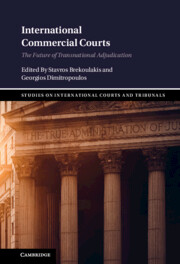Book contents
- International Commercial Courts
- Studies on International Courts and Tribunals
- International Commercial Courts
- Copyright page
- Contents
- Contributors
- Foreword
- Preface
- International Commercial Courts: The Future of Transnational Adjudication – An Introduction
- Part I A Contextual Perspective to International Commercial Courts
- 1 The Role of International Commercial Courts in Commercial Dispute Resolution
- 2 International Commercial Courts
- 3 Transnational Adjudication and the Court of Justice of the European Union
- 4 International Commercial Courts
- Part II Jurisdiction, Applicable Law and Enforcement of Judgments
- Part III Procedure, Function, Organization
- Part IV The Interplay between International Commercial Courts and Other Dispute Resolution Fora
- Part V International Commercial Courts and Global Governance
- Index
4 - International Commercial Courts
Lessons from International Criminal Tribunals
from Part I - A Contextual Perspective to International Commercial Courts
Published online by Cambridge University Press: 14 April 2022
- International Commercial Courts
- Studies on International Courts and Tribunals
- International Commercial Courts
- Copyright page
- Contents
- Contributors
- Foreword
- Preface
- International Commercial Courts: The Future of Transnational Adjudication – An Introduction
- Part I A Contextual Perspective to International Commercial Courts
- 1 The Role of International Commercial Courts in Commercial Dispute Resolution
- 2 International Commercial Courts
- 3 Transnational Adjudication and the Court of Justice of the European Union
- 4 International Commercial Courts
- Part II Jurisdiction, Applicable Law and Enforcement of Judgments
- Part III Procedure, Function, Organization
- Part IV The Interplay between International Commercial Courts and Other Dispute Resolution Fora
- Part V International Commercial Courts and Global Governance
- Index
Summary
International commercial courts have much to learn from international criminal tribunals (ICTs), as these were the first (along with investment tribunals) to combine domestic and international law, in a manner that today exemplifies the interplay of transnational law. Although ICTs dispensed criminal justice, their hybrid commercial counterparts of the twenty-first century do not depart from the ICT model of justice. There are striking similarities in that both wish to attract users and ultimately become financially independent; they both strive to convince their financiers that they are worth the effort and expense. Ultimately, and although this may not be apparent from the outset (and may not perhaps even be an indirect goal), both ICTs and hybrid commercial tribunals will have to show that they are truly legitimate and that they feed into the local legal system in a meaningful way. If they do not, they will have failed to meet the concerns and aspirations of all users of the pertinent legal system.
- Type
- Chapter
- Information
- International Commercial CourtsThe Future of Transnational Adjudication, pp. 89 - 112Publisher: Cambridge University PressPrint publication year: 2022



